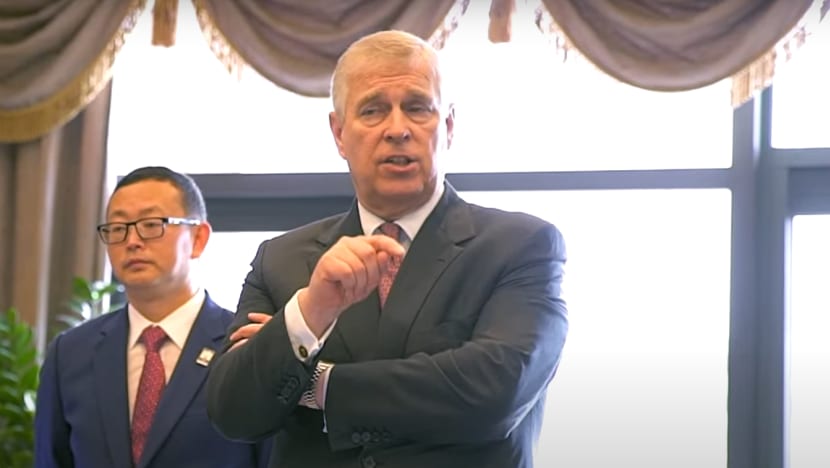Advertisement
Commentary
Allegations of a Chinese spy linked to Prince Andrew underline the tough choices Western countries must make if they want to engage with Beijing, says foreign policy adviser Christian Le Miere.

A screengrab of Yang Tengbo (left) with Prince Andrew (right) at a Pitch@Palace China 3.0 on Apr 14, 2019. (Image: YouTube/pitchatpalace)
New: You can now listen to articles. 
This audio is generated by an AI tool.

24 Dec 2024 06:00AM
LONDON: Is China a friend or foe to Europe?
For some European countries, China is one of the largest trade partners and investors. There could be a positive, symbiotic connection, but sometimes Beijing appears to undermine those relationships.
In the UK, details emerged in mid-December of an alleged Chinese spy who had developed close relations with, among others, Prince Andrew.
The case of Yang Tengbo, also known as Chris Yang, highlights the challenges that countries looking to build closer ties to China face. Concerns over espionage, unfair trading practices and cyberattacks all appear to be the price of access to China’s substantial market and investment opportunities.
The question countries such as the UK face is whether the costs are worth the benefits.
WHO IS YANG TENGBO?
Yang Tengbo is a 50-year-old Chinese businessman who has been a key figure in Sino-UK industrial relations for years. He serves as the executive chairman of the UK-Chinese Business Association and was a member of the 48 Group Club, another Sino-UK business association.
He first arrived in the UK in 2002 and by 2013 had gained indefinite leave to remain. Through his various firms, which aim to provide advice to facilitate interactions between Chinese and UK entities, and his association positions he developed a range of close relations with high-level political figures in the UK.
His relationship with Prince Andrew was so close as to be invited to the royal’s 60th birthday party and warrant the Duke of York’s senior advisor, Dominic Hampshire, to tell Yang that “outside of his closest internal confidants, you sit at the top of a tree that many, many people would like to be on”.
Through this connection, Yang joined visits to St James’ Palace and Windsor Castle, and has been photographed alongside David Cameron, Theresa May and her husband in Downing Street.
Yang’s level of access alarmed UK security forces. In 2021, he was stopped at the border and his digital devices were taken. The data from those devices led UK security services to believe that Yang was linked to the United Front Work Department, a Chinese government agency that utilises overseas Chinese citizens to gain influence and spy on individuals and organisations overseas.
In 2023, Yang’s residency rights were cancelled and he was banned from the UK.
AWKWARD TIMING
While there are significant questions over Yang’s level of influence and any nefarious activity, it is far from the only incident of espionage or malign operations by China against the UK.
In May, the UK accused Chinese hackers of accessing 270,000 payroll records of the UK armed forces. In January 2022, MI5 issued a security alert about an alleged Chinese agent, Christine Ching Kui Lee, who was alleged to be attempting to gain influence with UK parliamentarians on behalf of the Chinese government.
These influence and espionage operations are not confined to the UK. Countries throughout Europe, North America and Asia have all attributed similar operations to some form of Chinese official backing.
But the Yang case comes at a particularly awkward time for the UK’s new Labour government. Under Prime Minister Keir Starmer, the government is eager to foster growth at all costs, deepening trade relations with as many countries as possible, including the United States, European Union members, India and China.
The latest revelations about Chinese influence operations at the top of UK society is therefore embarrassing for the government as it attempts to smooth over its often bumpy relationship with Beijing.
The difficulties London faces in its relations with Beijing were highlighted by Starmer’s response to a question about Yang. Rather than openly criticise Beijing, Starmer chose instead to suggest that it was “better to engage” with China and that he was “pleased with the engagement and the progress that we’ve made”.
FRIEND OR FOE?
The problem for many countries, especially those in Europe struggling with tepid economic growth and facing the prospect of a hostile trade relationship with the US under Donald Trump, is that China is too big a market to ignore.
However, the price of doing business with China is often to downplay the influence operations, espionage, dumping and other malign activities that Beijing seems reluctant to dispense with.
From China’s perspective, the goal of such operations is to learn more about and gain more influence over countries in the West that are seen as competitors or rivals. London is a particularly good target, not only as a major economy and global power, but a close ally to the United States, major contributor to the North Atlantic Treaty Organization (NATO) and significant defence power in its own right.
The UK now must decide whether to paper over these unsightly activities by China for the sake of economic ties, or to make its position known to China.
A key moment will be whether the government allows a new Chinese embassy to be built on the site of the former Royal Mint, the maker of UK coins, in east London, despite objections from local authorities.
If approved, it would be China’s largest embassy in Europe and more than a third larger than the US’ own new embassy in south London. The number of diplomatic staff would give a huge boost to potential Chinese influence and espionage operations in the UK.
It remains to be seen if that is a price the Starmer government is willing to pay.
Christian Le Miere is a foreign policy adviser and the founder and CEO of Arcipel, a strategic advisory firm based in London.
